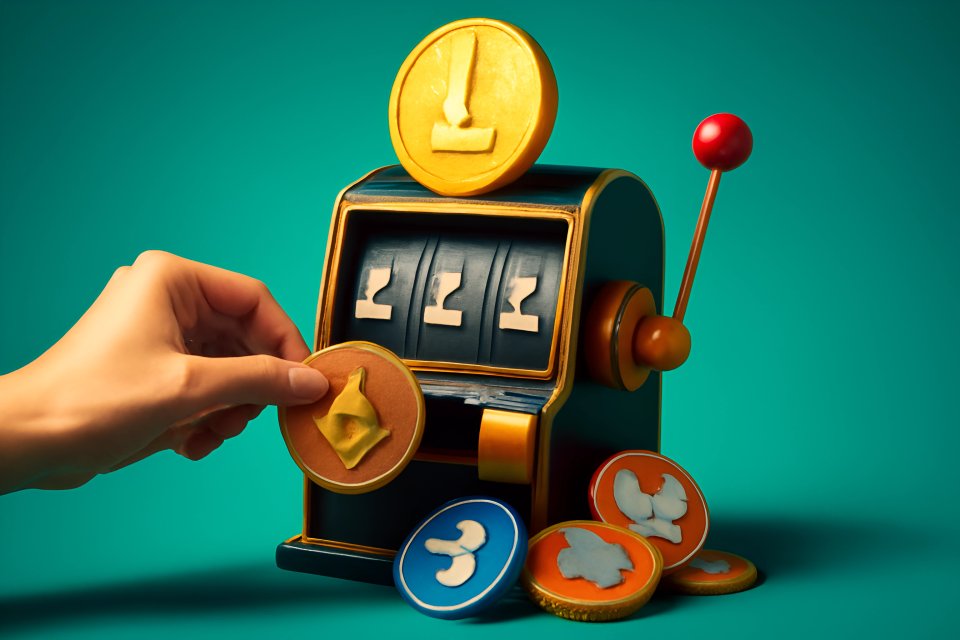
Tired of leaving your crypto casino fate to pure chance? The intoxicating world of crypto casinos – with its lightning speed, coveted anonymity, and groundbreaking innovation – pulls you in. But let's be honest, are you truly maximizing your potential, or are you just riding the waves of luck, hoping for that one big score? Many players, even seasoned ones, fall back on gut feelings or outdated tactics that simply don't cut it in today's sophisticated gaming landscape. They're leaving crypto on the table, and you don't want to be one of them.
Imagine possessing a crystal ball, one that deciphers the hidden language of casino games, revealing pathways to more consistent wins. That's the power of data analytics. It's your secret weapon to gain a formidable competitive edge, transforming your gameplay from hopeful guesses to informed, strategic assaults. In this deep dive, you'll discover how to analyze game trends like a pro, master crucial metrics that others ignore, and employ data to make decisions that could dramatically shift your outcomes. At Crypto Casino Sharks, we empower you to stop just playing and start playing smarter.
What is Data Analytics in the Crypto Casino Context?
So, what exactly is this "data analytics" beast in the crypto casino jungle? Forget stuffy corporate boardrooms; this is about you, the savvy player, unlocking the casino's digital DNA. Think of it as systematically gathering and interpreting every shred of game data – from the spin of a slot to the flip of a card – to uncover patterns, probabilities, and behavioral insights that scream "opportunity!" This isn't just about raw numbers; it's about transforming that data into actionable intelligence, your personal roadmap to more strategic decisions.
In the crypto casino realm, you're dealing with a rich tapestry of data. There's game-specific data: the Return to Player (RTP), volatility, hit frequency, and intricate paytables – these are the vital signs of any game. Then there's your player-specific data: your own betting patterns, your win/loss records, how long you play – your personal performance chart that reveals your strengths and weaknesses. And unique to crypto, there's blockchain data: transaction hashes, server and client seeds for provably fair games, offering a level of transparency that's a game-changer. As reported by DappRadar, blockchain gaming activity saw a significant year-on-year rise, highlighting the ever-expanding ocean of data available.
This is where casino game analytics becomes particularly potent, especially in the crypto space. Why? Because the transparency of provably fair systems is a goldmine. These systems allow players to independently verify each game outcome, ensuring you're not playing against a stacked deck. This ability to audit cryptographic seeds and transaction hashes adds an unparalleled layer of verifiable fairness, a stark contrast to traditional online casinos. By treating each game as a data-generating system, you can move beyond superstition and gut feelings, developing empirically validated tactics that account for mathematical probabilities and the unique dynamics of crypto gaming.
The "Why": Benefits of a Data-Driven Crypto Casino Approach
Why bother crunching numbers when you could be chasing jackpots? Because a data-driven approach is what separates the amateurs from the sharks. It’s about shifting from hopeful guesswork to calculated, strategic risks, fundamentally enhancing your profitability and giving you back control. Imagine knowing, with statistical backing, which games offer you the best shot and when to deploy your crypto for maximum impact.
By meticulously analyzing historical RTP and volatility metrics, you can cherry-pick games that offer optimal statistical advantages. For instance, prioritizing slots with an RTP consistently above 96% and a volatility level that matches your bankroll can create a more balanced risk-reward ratio. This selective power extends directly to your bankroll management; data from tracking your sessions informs personalized stop-loss limits and bet-sizing rules, drastically reducing those impulsive, emotionally-driven decisions that can wreck a session. Data-driven insights can significantly enhance casino experiences, often by personalizing offers and understanding player preferences, which you can use to your advantage.
Furthermore, the beauty of blockchain-native analytics is the ability to verify provably fair outcomes in real-time. This empowers you to detect anomalies and sidestep questionable platforms, focusing your energy and crypto on transparent, fair games. Beyond your individual gains, aggregated behavioral data can reveal macro-trends – think peak payout hours or the efficiency of token-specific bonuses – allowing you to time your bets with surgical precision. Ultimately, this cultivates a more sustainable and potentially profitable gaming journey. Indeed, as noted in a study by the UK Gambling Commission, data-informed players were significantly more likely to set responsible spending limits, proving that a winning crypto casino strategy is both smart and safe.
Core Data Points to Track and Analyze for Your Strategy
To build a truly effective crypto casino strategy data analytics plan, you need to focus on the right numbers. It's not about drowning in data; it's about extracting the golden nuggets. These core data points can be broadly categorized into game-specific metrics, your personal gaming data, and the unique data offered by provably fair systems.
Game-Specific Metrics: The Casino's Tell-All
These metrics are the casino's way of showing its hand, if you know where to look.
Return to Player (RTP): Your Long-Term Ally
What is RTP? It’s the theoretical percentage of all wagered money that a specific game will pay back to players over a very long period of play. Think of it as the game's generosity score. You'll usually find this crucial piece of information in the game's help or info section. Consistently choosing games with a higher RTP, for example, crypto slots like Starburst which often boasts an RTP around 96.01%, can demonstrably improve your potential returns over extended play compared to games with lower RTPs.
Volatility/Variance: Riding the Win Waves
Volatility (or variance) tells you about the risk involved in a game – specifically, how often you can expect to win and how large those wins might be. High-volatility games, such as the popular Bonanza or Book of Dead, tend to offer larger, but less frequent, jackpots – perfect for thrill-seekers with a robust bankroll. Low-volatility games, on the other hand, provide smaller, more frequent wins, suiting players who prefer steadier gameplay and longer sessions. Matching game volatility to your personal risk tolerance and bankroll size is paramount; you don't want to attempt to surf a financial tsunami with a budget meant for a kiddie pool.
Hit Frequency: How Often Does Cha-Ching Happen?
Hit Frequency refers to how often a game will produce any winning combination. This is an especially important metric for slot players. A higher hit frequency, sometimes upwards of 40% in certain games, can lead to longer play sessions and more excitement, but always cross-reference this with the paytable. Frequent small wins that don't even cover your bet aren't truly "wins" in the long run.
Paytable Analysis: Decoding the Treasure Map
The paytable is your treasure map to understanding a game's true payout potential. It details the value of each symbol, explains how bonus rounds are triggered, and reveals the maximum possible payouts. Don't just look at the flashy graphics; a deep dive into the paytable can uncover hidden value, such as slots where wild multipliers significantly amplify base-game payouts versus those with complex but ultimately low-value bonus features. This analysis is key to identifying games that offer real substance behind the style.
Personal Gaming Data: Know Thyself, Know Thy Game
Your own gaming habits are a rich source of data. Start by meticulously logging your sessions: note the game, date, time, your starting and ending balance, bet sizes, and any significant wins or losses. This personal gaming diary, perhaps kept in a simple spreadsheet, will quickly reveal patterns.
Are there specific times of day you play better? Do certain bet sizes yield more consistent results for you? Which games are consistently profitable, and which ones are crypto-draining black holes? The numbers won't lie. For instance, tracking your wallet transaction histories, which is easily done on the blockchain, can help verify payout consistency from casinos and detect any unusual platform-specific delays in withdrawals.
Provably Fair Game Data: Crypto's Transparency Power-Up
This is where crypto casinos truly shine, offering provably fair analytics. For games built on this technology, you can often access and verify the elements that determine game outcomes, such as server seeds, client seeds, and cryptographic hashes. Understanding how to use a provably fair verifier allows you to confirm the fairness of each result yourself.
While this is primarily about ensuring trust and transparency, analyzing this data across thousands of bets could theoretically help identify statistical deviations, though this is rare with legitimate, well-implemented provably fair systems. More practically, knowing a game is verifiably fair gives you the confidence to apply your strategies without the nagging fear of a rigged system, allowing you to focus purely on the mathematics and your data-driven crypto casino tips.
Here's a quick overview of key data points:
| Metric | What it is | Why it Matters for Strategy | Where to Find/Track |
|---|---|---|---|
RTP | % of wagered money returned to players over time | Higher RTP generally means better long-term value | Game info section, casino reviews |
Volatility | Payout size and frequency | Match to your risk tolerance & bankroll size | Game specifications, developer info, reviews |
Hit Frequency | How often any winning combination occurs | Impacts session length, excitement, & bankroll drain | Game specs, sometimes in detailed reviews |
Personal W/L | Your win/loss record per game/session/bet type | Identifies your profitable/unprofitable activities | Self-tracked spreadsheet, some casino dashboards |
Blockchain Data | Transaction hashes, seeds (for provably fair) | Verifies fairness, builds trust, game mechanic insight | Provably fair verifiers, blockchain explorers |
Applying Data Analytics: Game-Specific Strategies & Examples
Knowing the data points is one thing; applying them to forge a winning crypto casino strategy is where the real magic happens. Let's look at how crypto casino strategy data analytics can be applied to popular game types.
Crypto Slots: Spinning with Smarts
Forget superstitions about "hot" or "cold" machines; data is your best friend when tackling crypto slots. Start by filtering games based on their RTP (aim for 96% or higher for better long-term prospects) and volatility that aligns with your bankroll and risk appetite. If you're aiming for longer playtimes with more frequent, smaller wins, a low-to-medium volatility slot is your target. If you're chasing those electrifying, life-altering jackpots (and have the bankroll to sustain the hunt), high-volatility slots might be your arena.
Dive deep into the paytable analysis. Some bonus features are incredibly lucrative, offering free spins with multipliers or expanding wilds, while others are little more than flashy distractions with minimal payout potential. Crucially, use your session analytics to debunk the pervasive myth of "hot/cold" machines. Random Number Generators (RNGs) ensure every spin is an independent event; tracking hundreds of spins will reveal the true randomness of win distribution, preventing you from falling into the trap of fallacious pattern-chasing. These are essential data-driven crypto casino tips for any serious slots player.
Crypto Table Games: Calculated Bets, Not Wild Guesses
Table games, often seen as games of pure chance or complex skill, are ripe for data-driven optimization.
Blackjack: The Data-Driven Classic
Basic Blackjack strategy, readily available in chart form, is itself a product of intense data analytics, derived from simulating millions of hands to determine the optimal play for every possible dealer/player hand combination. Using perfect basic strategy can dramatically reduce the house edge, often to less than 0.5%. For advanced players, analytics can help evaluate the true value (or lack thereof) of side bets – most of which carry a significantly higher house edge – or even understand deviations if you're playing in an environment where card counting might be feasible (though extremely difficult in most online crypto casinos due to frequent shuffles and other countermeasures).
Roulette: Spinning the Numbers in Your Favor
With Roulette, probability analytics are key to neutralizing emotional biases. For starters, always choose European Roulette (with a single zero and a house edge of around 2.7%) over American Roulette (with a double zero and a much higher house edge of 5.26%). Tracking thousands of spins (many online tools can help or you can do it manually) will verify the randomness of the wheel, helping you avoid the gambler's fallacy of betting on "due" numbers. Understand the true odds and payouts for different bet types – from even money bets to single number bets – and align them with your strategy and bankroll.
Baccarat: Tracking Trends with a Critical Eye
Baccarat is famous for players meticulously tracking trends in Player, Banker, and Tie outcomes. While it's crucial to remember that each hand is an independent event (the gambler's fallacy looms large here), understanding why players track these trends can inform risk management if you choose to employ betting systems. For example, some players use systems like the "1-3-2-6" to attempt to cap losses during streaks while maximizing wins, though no system can overcome the inherent house edge. The Banker bet statistically has a slightly lower house edge than the Player bet over many hands, making it a data-backed preference for many strategists.
Crypto Poker: Reading Opponents and Odds
In crypto poker rooms, data is king. Track your own hand win rates from different positions and with various starting hands. If your platform or third-party tools allow, analyze opponent tendencies: their VPIP (Voluntarily Put Money In Pot), PFR (Pre-Flop Raise percentage), and overall aggression frequency (Agg%) can reveal exploitable patterns.
Furthermore, core poker concepts like pot odds and implied odds are pure data-driven calculations. Are you getting the mathematically correct price to call a bet based on the pot size and your chances of hitting a winning hand? Tools like Poker Copilot can provide real-time stats and help you analyze your game post-session, turning your play history into a valuable dataset for improvement.
Emerging Blockchain-Native Games: The New Frontier of Data
The world of blockchain-native games is constantly evolving, bringing new types of games with unique data landscapes. For these emerging titles, especially play-to-earn (P2E) games or those involving NFTs, a pioneering approach to crypto gambling analytics is needed. This might involve auditing smart contracts to verify token distribution fairness or tracking NFT trait rarity against marketplace prices to identify undervalued digital assets.
Data collection for these newer, often less documented, game types requires meticulous recording of inputs, outputs, and any observable mechanics. Look for patterns in smart contract interactions if they are visible on a block explorer. How are rewards distributed? What actions trigger specific game events? This is where your analytical skills can give you a significant edge in uncharted territory.
Tools and Techniques for Your Analytical Toolkit
Ready to become a data detective? You don't need a PhD in statistics, just the right tools and a willingness to learn.
Spreadsheets (Google Sheets, Excel): Your Data Command Center
Your primary weapon for personal data tracking and basic analysis will be a trusty spreadsheet program like Google Sheets or Microsoft Excel. They are perfect for logging your gaming sessions, tracking profits and losses, and performing simple calculations. Use basic formulas like SUM() to tally your total profit or loss, AVERAGE() to find your average bet size or win per session, and create simple charts to visualize trends in your performance over time. For example, a basic table could include columns for Date, Game Played, Starting Balance, Ending Balance, Profit/Loss, and Notes/Observations.
Note-Taking Apps: Capturing Qualitative Gold
Numbers tell a part of the story, but not all of it. Use a simple note-taking app (or even a physical notebook) to jot down qualitative observations during your sessions. How were you feeling? Were you playing "on tilt"? Did a particular strategy feel more comfortable or effective, even if the short-term numbers didn't immediately reflect it? This contextual information is vital for a holistic understanding of your play.
Online Calculators: Quick Math for Smart Plays
The internet is awash with free online calculators that can do some of the heavy mathematical lifting for you. Look for RTP calculators, odds calculators, and variance or standard deviation calculators specific to casino games. These tools can save you time and help you quickly assess the statistical profile of a game or bet.
Understanding Basic Statistical Concepts: Speak the Language of Data
You don't need to be a math whiz, but a basic understanding of a few statistical concepts will go a long way.
- Mean (Average): The sum of all your values (e.g., session profits/losses) divided by the number of values. This gives you your average outcome.
- Median: The middle value in a sorted dataset. This can be more representative than the mean if your data has extreme outliers.
- Standard Deviation: A measure of how spread out your results are from the average. In casino terms, it’s a numerical representation of
volatilityand a keycrypto casino metricfor bankroll management.
Leveraging Provably Fair Verifiers: Trust but Verify (and Learn!)
For crypto casinos offering provably fair games, make use of their verifier tools. These allow you to input the server seed, client seed, and nonce to independently confirm the outcome of a game round. Beyond just building trust, playing around with these verifiers can help you understand the mechanics of how results are generated, which can sometimes offer subtle insights. You can learn more about Mastering Blockchain RNG and how to verify fair play in crypto casinos on our site.
Crypto Casino Sharks Resources: Your Knowledge Hub
We're committed to arming you with the best information. For deeper dives into specific metrics or game types, explore resources like our guide on Advanced Slot Strategies for Crypto Casinos. Combining these tools and resources will build a powerful analytical toolkit.
The Human Factor: Limitations, Biases, and Responsible Gaming
While data analytics is an incredibly powerful tool, it's crucial to remember its limitations and the ever-present human element. Data is a guide, not an infallible crystal ball.
Data is a Guide, Not a Crystal Ball: Embrace the Chaos
Randomness and variance are inherent components of all casino games. Even with a 96% RTP, that still implies a 4% expected loss to the house over the very long term. Data helps you navigate this randomness and make more informed decisions to minimize losses and capitalize on favorable situations, but it cannot eliminate the underlying house edge or predict purely random outcomes.
Avoiding Gambler's Fallacy: Don't Chase Ghosts
One of the most dangerous cognitive traps is the gambler's fallacy – the mistaken belief that past independent events can influence future outcomes. If a roulette wheel lands on red ten times in a row, the odds of it landing on black on the next spin are still the same as they always were. Each spin, each deal of the cards (from a freshly shuffled deck), each slot pull is an independent event. Don't let this fallacy derail your data-driven crypto casino tips.
Confirmation Bias: Seeing What You Want to See
Humans are wired to look for patterns, and sometimes we see them even when they aren't there, or we interpret data in a way that confirms our pre-existing beliefs. This is confirmation bias. Be brutally honest when analyzing your data. Don't just look for evidence that your "pet strategy" is working; be open to the possibility that the numbers are telling you something different.
The Importance of Sample Size: Don't Judge a Book by its First Page
A few lucky wins or a short losing streak don't provide enough data to draw meaningful conclusions. Small data sets can be incredibly misleading. For your analysis to be statistically reliable, you need a significant sample size – think hundreds, if not thousands, of game rounds or hours of play for certain types of analysis. This is fundamental to any advanced casino strategy.
Responsible Gambling with Data: Play Smart, Stay Safe
This is paramount. Data analytics should be a tool for enhancing your enjoyment and control, not for fueling obsessive or harmful behavior. Use your analytical insights to set realistic expectations and, most importantly, strict loss limits and win goals. For example, understanding your typical session's standard deviation can help you set a stop-loss that accounts for normal variance.
Know when to stop, even if the "data" seems to suggest a trend might be "due." Your financial and mental well-being always comes first. Crypto Casino Sharks is a staunch advocate for intelligent and secure crypto casino play. Effective bankroll management is a cornerstone of this; we encourage you to explore our Step-by-Step Guide to Managing Your Digital Bankroll in Crypto Casinos and our strategies for Advanced Bankroll Management for Serious Crypto Gamblers. For those navigating the choppy waters of the crypto market, our Practical Bankroll Management in a Volatile Crypto Market: Tips for Casino Players offers further specialized advice.
Conclusion: Sharpen Your Edge with Data Analytics
Let's cut to the chase: data analytics isn't just some arcane science for lab coats and mathematicians. In the electrifying arena of crypto casinos, it's your master key, transforming your play from a wild game of pure chance into one of calculated, informed strategy. By embracing crypto casino strategy data analytics, you move beyond hoping for luck and start architecting your success. You've seen how understanding and applying key metrics like RTP, volatility, and your own meticulously tracked play can lead to smarter game selection, optimized betting patterns, and vastly improved bankroll management. This is the power to take control.
The journey to becoming a data-savvy crypto casino player starts with small, deliberate steps. Begin by tracking your play. Note your wins, your losses, the games you choose, and how you feel. Gradually build your analytical skills, experiment with the tools we've discussed, and always remain critical and responsible. You have the power to sharpen your edge, to see what others miss, and to approach the crypto tables with a newfound confidence and clarity.
What data points are YOU already tracking to dominate the crypto casino landscape? What are your killer data-driven crypto casino tips? Spill your secrets and share your wisdom in the comments below – let's build a smarter community together!
Hungry for more advanced insights? Explore more advanced game strategies for digital bettors and stay ahead of the curve with our analysis of future trends in sports betting and evolving crypto casino technologies right here on CryptoCasinoSharks.com. And don't forget to join our community for more killer insights and to discover innovative betting with crypto that goes beyond traditional methods!
















